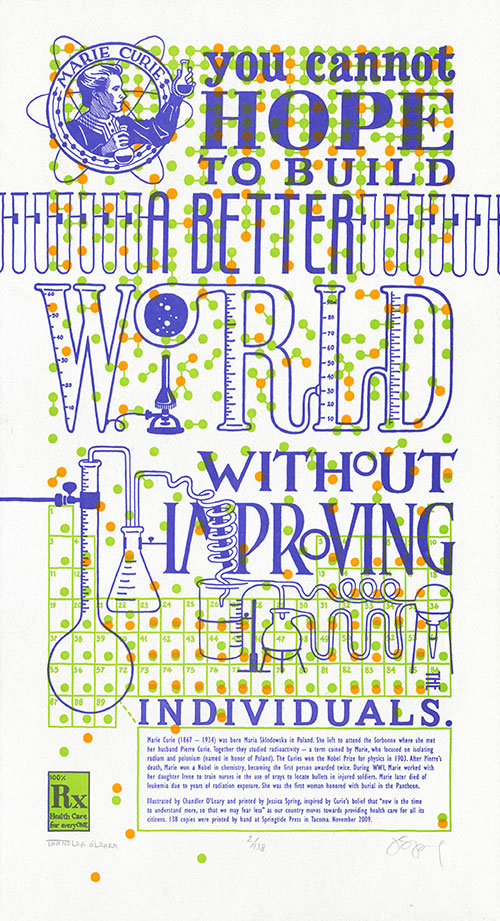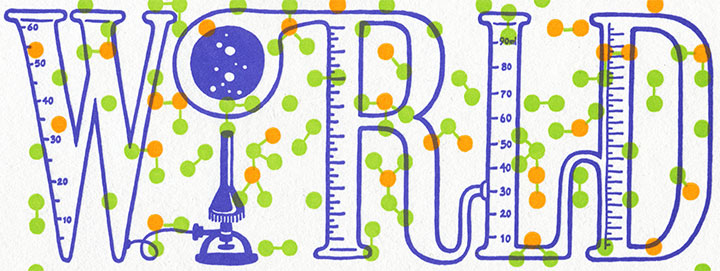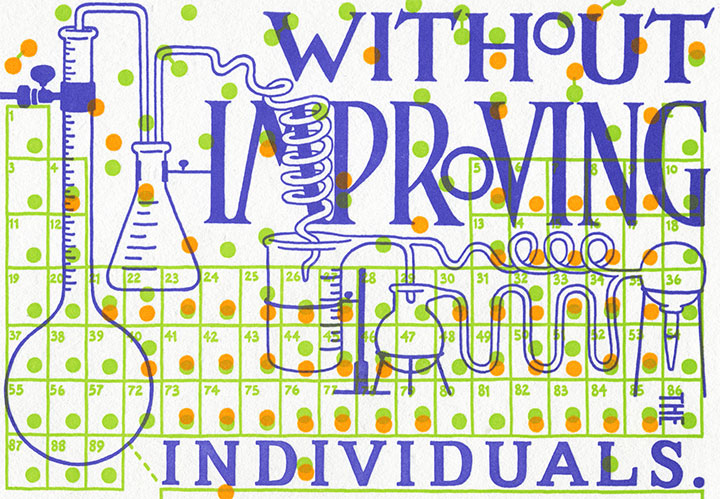I guess it was inevitable that Jessica and I would veer back into controversial territory eventually—we’re a little ornery, after all (as if you hadn’t guessed). We’ve been sitting on this concept for several months now, and have put it off a couple of times in order to move Thea Foss and Harriet Tubman ahead in the queue. Now, though, the time feels right—or maybe we’re just so upset and keyed up by the issue at hand that we just couldn’t wait any longer. Either way, we’d like to offer our take on what a famous scientist might have had to say about health care:
You cannot hope to build a better world without improving the individuals. —Marie Curie
I’ll spare you the ranting and raving that you can find in countless other pockets of the internet (or my house), except for one small, very personal anecdote about this topic. You see, I am self-employed, as a working artist and bona-fide small business owner. And it’s a mighty good thing that I happen to be married to someone with a full-time employer, because when I traded my graphic design day job to go full-time with my business, I also gave up access to health insurance that was anywhere near affordable. So I am currently on my husband’s health insurance, which costs us—wait for it—approximately $650 a month. That’s just to cover me, and I don’t have any “preexisting conditions” (why is it that I always want to say “preconceived notions?”) or other health problems. Since we absolutely refuse to be among the millions of uninsured, remaining able to pay for coverage is our top priority. Except that’s about to get a lot harder, because this coverage—which is provided by one of the two American “non-profit” insurance co-ops, by the way (remember the buzz about those?)—will be increasing by twenty percent come January. I don’t say this to garner attention or sympathy or to ask for advice—merely to illustrate my first-hand experience of the unsustainability of the system. I won’t prolong this post by weighing in on my personal preferences for health care reform, but something, somehow, has to change.
Here’s where Marie Curie comes in. Despite being snubbed and rejected by her peers again and again, Curie devoted her life’s work (and ultimately her own health) to finding answers. And what she found not only changed our understanding of science forever, but also laid the foundation for many of the medical treatments we take for granted today.
In tribute to her tireless efforts, The Curie Cure is a miasma of small details that slide in and out of focus as they compose the “bigger picture.” Each individual atom, printed in fluorescent ink, battles the text for attention—in vivid, radioactive color. The edition size is a nod to Curie’s discovery of new elements (the half life of polonium is 138 days), while the connected scientific equipment illustrates the trickle-down effect of any political action. Above all, the dominating pattern of molecule diagrams serves as a reminder that we’re all in this together.
• • • • • • • • • • • • • • • • • • • • • • • • • • • • • • • • • • • • • • • • • • • • • • • • • • • • • • • •
The Curie Cure: No. 6 in the Dead Feminists series
Edition size: 138
Poster size: 10 x 18 inches
Printed on an antique Vandercook Universal One press, each piece is printed on archival, 100% rag, recycled paper, and signed by both artists.
Colophon reads:
Marie Curie (1867–1934) was born Maria Sklodowska in Poland. She left to attend the Sorbonne where she met her husband Pierre Curie. Together they studied radioactivity — a term coined by Marie, who focused on isolating radium and polonium (named in honor of Poland). The Curies won the Nobel Prize for physics in 1903. After Pierre’s death, Marie won a Nobel in chemistry, becoming the first person awarded twice. During WWI, Marie, worked with her daughter Irene to train nurses in the use of xrays to locate bullets in injured soldiers. Marie later died of leukemia due to years of radiation exposure. She was the first woman honored with burial in the Pantheon.
Illustrated by Chandler O’Leary and printed by Jessica Spring, inspired by Curie’s belief that “now is the time to understand more, so that we may fear less” as our country moves towards providing health care for all its citizens. 138 copies were printed by hand at Springtide Press in Tacoma. November 2009.
UPDATE: poster is sold out. Reproduction postcards available in the shop!



